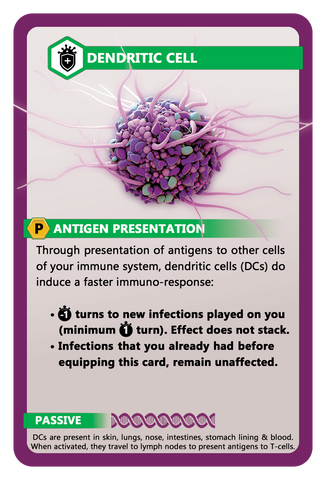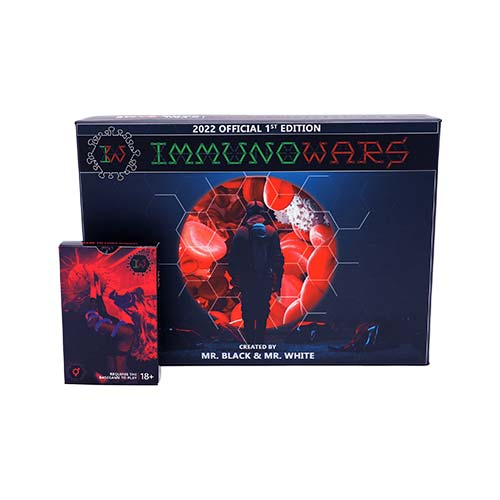Today, we're diving into the intricate world of dendritic cells – the friends who always have your back. These cells may not be as famous as their T and B cell counterparts, but they play a crucial role in orchestrating your body's defence mechanisms. Join Mr. White as he leverages the power of these cells to fend off Mr. Black's relentless attacks. Or will you join Mr. Black, exploiting the complexities of the immune system for your own gain?
Did you know that dendritic cells are the most potent antigen-presenting cells in your body? Or that they were first discovered in the skin, hence their name derived from the Greek word "dendron" for tree? Fasten your seatbelts as we journey through the fascinating world of immunology and their role in the epic ImmunoWars showdown.
Top 5 Fascinating Facts About Dendritic Cells
Prepare for an enlightening journey as we unravel some lesser-known facts about dendritic cells that will leave you in awe. Here are the top 5 fascinating dendritic cell facts, perfect for your next play to impress your friends.
1. Dendritic Cells: The Master Puppeteers of the Immune System
Dendritic cells are the maestros of the immune system, orchestrating the body's response to invaders. They capture, process, and present antigens to T cells, triggering an immune response. This unique ability to link the innate and adaptive immune systems makes them indispensable in the fight against infections and diseases.
2. The Origin of Dendritic Cells
Dendritic cells originate from bone marrow progenitors and can be found in various immature forms in the blood. Upon encountering an antigen, they mature and migrate to the lymph nodes, where they present the antigen to T cells, initiating an immune response.
3. Dendritic Cells and Cancer
Dendritic cells play a crucial role in cancer immunotherapy. They can be loaded with tumor antigens and used as vaccines, teaching the immune system to recognise and attack cancer cells. This promising approach is currently being explored in various clinical trials.
4. The Many Faces of Dendritic Cells
Dendritic cells are a diverse group, with different types performing different functions. For instance, plasmacytoid dendritic cells are known for their ability to produce large amounts of interferon, a key player in antiviral responses.
5. Dendritic Cells in ImmunoWars
In the thrilling world of ImmunoWars, dendritic cells are powerful allies. They can be activated to present antigens to T cells, triggering a robust immune response. But beware, Mr. Black can exploit these cells to create immune confusion, leading to autoimmune attacks. The battle is fierce, and the stakes are high.
Dendritic Cells – The Immune System's Watchtowers
Dendritic cells, named for their tree-like extensions, are the watchtowers of the immune system. They are constantly on the lookout for foreign invaders, ready to alert the rest of the immune system at the first sign of trouble. Their ability to capture, process, and present antigens to T cells makes them a crucial player in the body's defence against infections and diseases.
The Many Faces of Dendritic Cells
Dendritic cells are a diverse group, with different types performing different functions. For instance, plasmacytoid dendritic cells are known for their ability to produce large amounts of interferon, a key player in antiviral responses.
Dendritic Cells and Their Role in Cancer Defense
Dendritic cells play a crucial role in cancer immunotherapy. They can be loaded with tumor antigens and used as vaccines, teaching the immune system to recognise and attack cancer cells. This promising approach is currently being explored in various clinical trials.
Dendritic Cells in the World of ImmunoWars
In the thrilling universe of Immunowars, dendritic cells are powerful allies. They can be activated to present antigens to T cells, triggering a robust immune response. The Dendritic Cell Card, like other ImmunoCards must be put open in front of you, to be active. This will cost you 1 action in your turn.

Mr. Black's Battle Tactics: Exploiting Dendritic Cells
Step into the sinister shoes of Mr. Black and join the dark side as we unveil his merciless battle tactics. Dendritic cells may not be the most formidable opponent in the ImmunoWars universe, but with their ability to trigger powerful immune responses, they can be a game-changer.
First, let's talk about Antigen Presentation. When Mr. Black wants to avoid dendritic cells, he can counters with autoimmune responses, causing the opponent's immune system to attack its own cells. Or attack your opponent with infections like HIV which undermine your opponents Immune defence.
Join Mr. Black and his army as you strategise, infect, and spread disease across the game board. Your opponents won't know what hit them until it's too late. Share your best counter attacks as comment under this blog!
Mr. White's Defence Strategies
Mr. White, known for his relentless pursuit of victory, doesn't hesitate to use the power of dendritic cells to his advantage. The Dendritic Cell Card is great addition to your (passive) defence to minimise the harm of infections. Dendritic Cells shorten the timespan by reducing the Timer Tokens with -1 of all diseases you suffer from, with a minimum of 1 Timer Token. The Effect does not stack, which means a one-time reduction.
FAQ about Dendritic Cells
What are dendritic cells?
Dendritic cells are immune cells that play a crucial role in the body's defence against infections and diseases. They capture, process, and present antigens to T cells, sparking an immune response.
How do dendritic cells contribute to immunity?
Dendritic cells serve as a bridge between the innate and adaptive immune systems. They capture antigens from pathogens, process them, and present them to T cells, triggering a specific immune response.
Can dendritic cells be used in cancer treatment?
Yes, dendritic cell-based vaccines are a promising approach in cancer treatment. These vaccines involve loading dendritic cells with tumor antigens and reintroducing them into the patient's body, teaching the immune system to recognise and attack cancer cells.
How can I boost the function of my dendritic cells?
Maintaining a healthy lifestyle can help keep your immune system, including dendritic cells, in top shape. Regular exercise, a balanced diet, adequate sleep, and stress management can all contribute to a robust immune system.
Conclusion
Dendritic cells – the master orchestrators of immunity – have proven themselves to be a formidable player in the twisted game of ImmunoWars. These cells are constantly on the lookout for foreign invaders, ready to alert the rest of the immune system at the first sign of trouble. Their ability to capture, process, and present antigens to T cells makes them a crucial player in the body's defence against infections and diseases.
As you've discovered, Mr. Black's dendritic cell battle strategies can turn the tide in ImmunoWars, causing the opponent's immune system to attack its own cells. It just goes to show that even the most inconspicuous foes can pack a powerful punch when underestimated.


